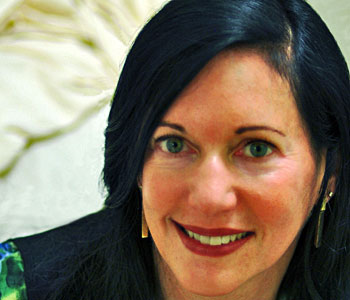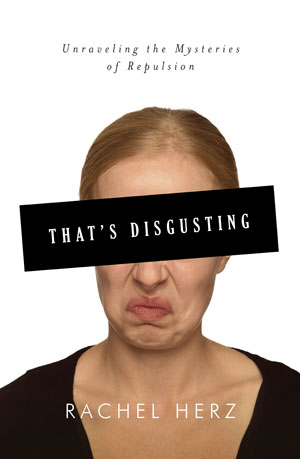
That’s Disgusting is about the enigmatic and paradoxical nature of being human told through the lens of the emotion of disgust, our repulsions and our attractions, and the very fine line that separates them.
The book begins with an immediately intuitive and familiar experience of disgust—food. Then it moves to a basic primer of the various forms of disgust and its neurobiological underpinnings, providing illuminating and strange facts. For example, the earliest symptom of Huntington’s Chorea, before any physical problems manifest, is the inability to recognize the facial expression of disgust; feral “wild” children never acquire disgust; psychopaths are notoriously undisgustable.
I then tackle fundamental questions regarding what the main purpose of the emotion of disgust is—to protect us from death, most predominantly death by disease—and how this mutates, can backfire in our social interactions with others, and incite the worst of human behavior.
That’s Disgusting then explores how and why we are enticed by disgust, such as with horror movies, and our fascination with death, our animality, and our sexuality. The last chapters move on to more abstract and complex levels of disgust, in particular morality, and the book concludes by examining what we can learn from disgust and how disgust can be harnessed for the greater good.
Some of the original theoretical arguments and conclusions the book makes are that: 1) disgust evolved uniquely in humans from the emotion of fear to protect us from death by a slow as opposed to a fast process (e.g., disease v. tiger); 2) disgust is an inherently “selfish” emotion and actually a twisted form of empathy; 3) to be disgusted is a luxury of abundance. In other words, we have to have options for survival in order to shun a pockmarked mate or moldy food.
In sum, That’s Disgusting explores how society, culture, neurobiology and evolution weave together to shape both our personally unique experience of the emotion of disgust and more generally who and what we are as human beings. I think a reader will be most happy with, and appreciative of, this book if she approaches it with a mixture of intellectual curiosity and whimsy.
The general rubric under which the concepts of this book are laid out is evolutionary biology. The core positions are about how and why the emotion of disgust aids in our survival.
However, a parallel argument is that disgust is not innate and not necessarily universal—rather disgust is the “instinct” that has to be learned. Thus, That’s Disgusting straddles the nature–nurture divide. At the same time, I reveal how there are numerous oddities that the emotion of disgust compels which defy both culture and biology—most particularly how we are lured by, attracted to, and manipulate others with disgust.
There were several intertwined motivations that drew me to the topic and ultimately to writing That’s Disgusting.
The first instigator was actually a joke. Several years ago, I was invited to be the celebrity judge for the National Rotten Sneakers Contest in Montpelier, Vermont, an annual contest held since 1975 that is notable enough to be listed in the Farmer’s Almanac. I was told that my job would be to sniff the sneakers of kids from around the country who had already won their regional odoriferous challenges and then to decide who had the stinkiest footwear of them all. Before I left for Vermont, many of my friends cajoled me with questions: “How will you be able to stand it?” “How could you have agreed to such a thing?” “Won’t it be just too disgusting?” I started to joke with them that I was doing it as research for the sequel to the book I had just written, The Scent of Desire, and that now I was going to write “The Scent of Disgust.” This is not quite what happened, but ultimately this quip set the ball in my mind rolling about writing a book on disgust.
Behind that joke, I had long been intrigued by disgust from what I had learned from Paul Rozin, a colleague and friend at the University of Pennsylvania, whom I had the privilege to share interests with many years before.
With regard to my preparation for writing the book, disgust shares many commonalities with the sense of smell—such as how context, culture, situation, language, meaning and personality shape our experience and interpretation of it. I believed that my insights in smell would give me access to a different perspective on disgust than most experts in the field, and enable me to use the sense of smell as a guide for my understanding of this unusual emotion. Since I hadn’t already dedicated a career to disgust, I felt I could bring a fresh view to the topic but also have the same questions and curiosity about disgust that any interested reader would. Disgust, also turns out to be a great way to examine the interplay between biology and psychology, which are the constructs of being human that I am most intrigued by.
I would hope someone stumbling upon That’s Disgusting in a bookstore either first thumbed through the chapter on horror and perverse pleasures (Chapter 6, “Horror Show”), or the chapter on morality (Chapter 8, “Law and Order”). I also hope that after skimming either of these chapters that reader would flip through the chapter on food, (Chapter 1, “Let’s Eat”).
Teaching my seminar course, “The Psychology of Aversion,” at Brown University, I discovered that horror movies have huge appeal. However, I also know that interest in horror wanes with age and that not everyone is attracted to it—quite the opposite in fact, though this can also be a motivator for interest. Therefore, readers who are intrigued by horror movies and more generally by the perversity of being attracted to things that are disgusting and “deadly” would be recommended to have a glance through this chapter.
Though I did not expect it while writing, the chapter on morality has been singled out by many who have formally reviewed the book as being of particular interest. Moral disgust is also particularly complex and scientifically unresolved, and in fact I do not believe that we are disgusted in many instances when we say we are. Why and what we are actually feeling is also revealed in Chapter 8.
The chapter on food touches on many of the conceptual curiosities that the rest of the book tackles in more depth—cross-cultural diversities and perversities, breaching taboos, and how mere thought can turn something from delightful to disgusting. This chapter also contains a fair share of pop-culture oddities.
You do not need to be trained in science or anthropology to appreciate That’s Disgusting. I wrote it solely with the general reader in mind, and my wish is that it is accessible, enjoyable and interesting to all.
At the same time, I believe that each reader will come to That’s Disgusting with a unique perspective and take away different things from it that are singular to him or her. We have all experienced disgust and therefore we can all approach it with our own personal tendencies and peculiar intrigues. Moreover, That’s Disgusting enables the reader to indulge in their secret fascinations, providing a private window through which the reader can examine themself as well as lay their eyes on others.
I am not so bold as to believe that there are any great consequences or implications to be gained from reading the book—but I do hope that it makes readers think about their lives and the way they treat other people in a slightly different and more appreciative way.


Rachel Herz, Ph.D., is on the faculty at Brown University and a professional consultant. Besides That’s Disgusting, featured on Rorotoko, she is the author of The Scent of Desire: Discovering Our Enigmatic Sense of Smell (2007), a finalist for the 2009 AAAS/Subaru/SB&F Prize for Excellence in Science Books.